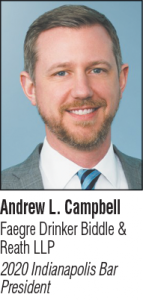Subscriber Benefit
As a subscriber you can listen to articles at work, in the car, or while you work out. Subscribe Now During her eulogy for the late Justice Antonin Scalia, Justice Ruth Bader Ginsburg recalled one of her favorite Scalia stories — when President Bill Clinton was considering his first nomination to the Supreme Court, Justice Scalia was asked, “If you were stranded on a desert island with your new court colleague, who would you prefer, Larry Tribe or Mario Cuomo?” Scalia answered quickly and distinctly: “Ruth Bader Ginsburg.” “And within days, the President chose me,” Justice Ginsburg quipped.
During her eulogy for the late Justice Antonin Scalia, Justice Ruth Bader Ginsburg recalled one of her favorite Scalia stories — when President Bill Clinton was considering his first nomination to the Supreme Court, Justice Scalia was asked, “If you were stranded on a desert island with your new court colleague, who would you prefer, Larry Tribe or Mario Cuomo?” Scalia answered quickly and distinctly: “Ruth Bader Ginsburg.” “And within days, the President chose me,” Justice Ginsburg quipped.
Justice Ginsburg’s life was reflected in a quote she gave during a 2012 interview: “So often in life, things that you regard as an impediment turn out to be great, good fortune.” Her background likely would have been an impediment for many: “I am a first generation American on my father’s side, barely second generation on my mother’s. Neither of my parents had the means to attend college, but both taught me to love learning, to care about people and to work hard for whatever I wanted or believed in.” During her confirmation hearing, she explained that “what has become of me could happen only in America. Like so many others, I owe so much to the entry this nation afforded to people yearning to breathe free.”
Famously, Justice Ginsburg graduated from Columbia Law School tied first in her class. Yet, she was rejected for a Supreme Court clerkship because of her gender. That experience, among others during her early career, inspired much of her life’s work as an advocate for women’s rights. The simplest explanation of “feminism,” she explained in 2012, “is a song that Marlo Thomas sang, ‘Free to Be You and Me.’ Free to be, if you were a girl — doctor, lawyer, Indian chief. Anything you want to be. And if you’re a boy, and you like teaching, you like nursing, you would like to have a doll, that’s OK too. That notion that we should each be free to develop our own talents, whatever they may be, and not be held back by artificial barriers — manmade barriers, certainly not heaven sent.”
She employed that philosophy during her 27 years on the Supreme Court, including when she wrote for the majority striking down the longstanding male-only admission policy of the Virginia Military Institute: “[T]he Court has repeatedly recognized that neither federal nor state government acts compatibly with the equal protection principle when a law or official policy denies to women, simply because they are women, full citizenship stature — equal opportunity to aspire, achieve, participate in and contribute to society based on their individual talent and capacities.”
Despite her personal achievements as a Supreme Court litigator and justice, she was quick to recognize that “the work of perfection is scarcely done. Many stains remain . . . [W]e still struggle to achieve greater understanding and appreciation of each other across racial, religious and socioeconomic lines.” But, again, these impediments were an opportunity for Justice Ginsburg, to “strive to realize the ideal — to become a more perfect union.”
Although that task often appeared insurmountable, Justice Ginsburg made it clear that the makeup of the judiciary offered solutions: “[A]t the end of the day, a wise old man and a wise old women will reach the same decision. But it is also true that women, like persons of different racial groups and ethnic origins, contribute ‘a distinctive medley of views influenced by differences in biology, cultural impact and life experience.’ Our system of justice is surely richer for the diversity of background and experience of its judges. It was poorer when nearly all of its participants were cut from the same mold.”
Her personal relationships in life made her contributions toward “a more perfect union possible” — something we can all learn from: “If you have a caring life partner, you help the other person when that person needs it. I had a life partner who thought my work was as important as his, and I think that made all the difference for me.”
Ultimately, Justice Ginsburg paved the way for many, including my daughter, and encouraged us all to do the same: “And as you pursue your paths in life, leave tracks. Just as others have been way pavers for you, so you should aid those who will follow in your way. Do your part to help move society to the place you would like it to be for the health and well-being of generations following your own.”
Regardless of our fractured politics, we can all appreciate that Justice Ginsburg was an inspired “guardian of the great charter that has served as our nation’s fundamental instrument of government for over 200 years.” But, she cautioned, “Justices do not guard constitutional rights alone; courts share that profound responsibility with Congress, the president, the states and the people. The constant realization of a more perfect union, the Constitution’s aspiration, requires the widest, broadest, deepest participation on matters of government and government policy.”
Let us reflect on and be inspired by Justice Ginsburg’s life and career. And, importantly, do our individual part to work toward a more perfect union. •
Please enable JavaScript to view this content.
